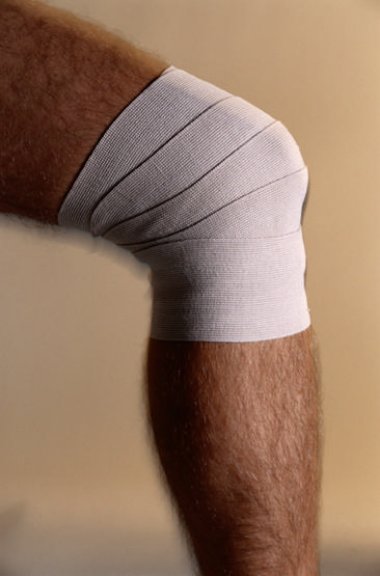Glucosamine and chondroitin sulfate combo may aid in osteoarthritis
 Combined supplementation with chondroitin sulphate and glucosamine could help to reduce knee joint pain, stiffness, and functional disability of people with osteoarthritis, according to new research published in the top rheumatology journal: Annals of the Rheumatic Diseases.
Combined supplementation with chondroitin sulphate and glucosamine could help to reduce knee joint pain, stiffness, and functional disability of people with osteoarthritis, according to new research published in the top rheumatology journal: Annals of the Rheumatic Diseases.
The study was a double-blind Multicenter Osteoarthritis Intervention trial called "MOVES" In total 606 patients with knee osteoarthritis and moderate-to-severe pain participated in the trial. The patients were recruited from France, Germany, Poland, and Spain. The patients were randomised to receive 400 mg condroitin sulfate (GS) plus 500 mg glucosamine hydrochloride (GLU) three times a day or 200 mg celecoxib every day for six months.
Celecoxib is an anti-inflammatory drug of the NSAID type used to treat among others the signs and symptoms of osteoarthritis and acute pain in adults.
The primary objective of the study was to reduce the score from a standard questionnaire called WOMAC used by health professionals to evaluate the condition of patients with osteoarthritis.
Study results
At the end of the study, there was a reduction of around 50% in WOMAC pain (main outcome) in both treatment groups, without significant differences between them (p=0.92). Also, there were no differences in the secondary outcomes: WOMAC stiffness (p=0.43), WOMAC function (p=0.53), VAS pain (p=0.92) and OMERACT-OARSI* response, which was of 79% (p=0.91) in both groups. Both the Combination of CS+GLU and Celecoxib elicited a reduction >50% in the presence of joint swelling (p=0.54) and effusion (p=0.61) without differences between them. No differences were observed for the other secondary outcomes.
*OMERACT: Outcome Measures in Rheumatology
OARSI: Osteoarthritis Research Society International
Lesser side effects using glucosamine and chondroitin sulfate
Globally, it can be concluded that chondroitin sulphate and glucosamine taken together exerts a clinically relevant symptomatic effect and equivalent to Celecoxib, but with a better safety profile, meaning lesser side effects which is more suitable for a chronic pathology such as osteoarthritis.
Different mechanisms of action
Studies have demonstrated anti- inflammatory effects of both glucosamine and chondroitin sulfate. Both inhibit metalloproteinase activity, prostaglandin E2 release, nitric oxide production and degradation of glycosaminoglycans, as well as stimulate the synthesis of hyaluronic acid in the joint. Chondroitin sulfate stimulates collagen synthesis, while glucosamine inhibits prostaglandin release.
There is a difference in the mechanisms of action between chondroitin sulfate plus glucosamine and celecoxib which is supported by the present results, indicating more substantial and faster response for celecoxib than for chondroitin sulfate plus glucosamine up to 120 days, but by 6 months there are no significant differences between the two treatments across all outcomes.
Ref.
Hochberg MC, et al. Combined chondroitin sulfate and glucosamine for painful knee osteoarthritis: a multicentre, randomised, double-blind, non-inferiority trial versus celecoxib. Ann Rheum Dis. 2015. Epub ahead of print.
CommentaryThe study is a good example that it is the combination of glucosamine and sulfur, that is effective. Without the condroitin sulphate the glucosamine hydrochloride would very likely not be able to match the effect of the arthritis medication. |
- Created on .








 Most people are unaware of vitamin C’s key role in mental health and mood. According to a large population study that is published in Frontiers in Nutrition, having higher levels of vitamin C in the blood is linked to a lower risk of depression. The official dietary recommendations for vitamin C only focus on preventing the potentially lethal deficiency disease called scurvy, and things like stress, ageing, stimulant use, overweight, infections, and chronic illnesses can increase your need for the nutrient.
Most people are unaware of vitamin C’s key role in mental health and mood. According to a large population study that is published in Frontiers in Nutrition, having higher levels of vitamin C in the blood is linked to a lower risk of depression. The official dietary recommendations for vitamin C only focus on preventing the potentially lethal deficiency disease called scurvy, and things like stress, ageing, stimulant use, overweight, infections, and chronic illnesses can increase your need for the nutrient.

 "After about one week of taking the Q10 supplement I could feel a huge difference," says 23-year old Alan Piccini, who has been suffering from extreme fatigue and muscle aches ever since he was a child.
"After about one week of taking the Q10 supplement I could feel a huge difference," says 23-year old Alan Piccini, who has been suffering from extreme fatigue and muscle aches ever since he was a child. “Taking capsules with co-enzyme Q10 has freed me of the severe side effects of my cholesterol lowering medicine,” Mrs Franken explains.
“Taking capsules with co-enzyme Q10 has freed me of the severe side effects of my cholesterol lowering medicine,” Mrs Franken explains.